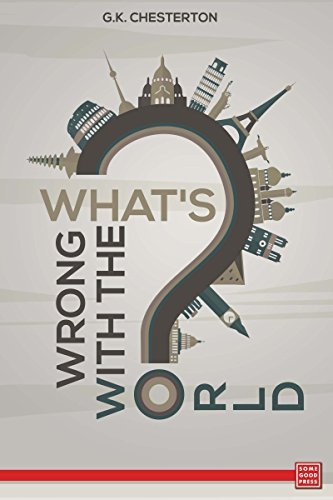 The world is in trouble. Everyone points out flaws, issues, and problems. Where did these situations come from and what can we do? There is a deeper problem under all the others. Let us take a journey to see What is Wrong with the World.
The world is in trouble. Everyone points out flaws, issues, and problems. Where did these situations come from and what can we do? There is a deeper problem under all the others. Let us take a journey to see What is Wrong with the World.
Problem discussed: Not finishing the good that began in the past.
The rallying cry today is to be ‘on the right side of history’, but what does that really mean? It means to some that progress shows that the old is irrelevant and to be ignored. For others it is a cry to blindly change things with no real ideals but only feelings. The reality of it all is that even if some things in the past were left behind they may be what we need to save us today. Like a good fairy tale the relic that saves the kingdom is from a bygone and wiser era.
The task of modern idealists indeed is made much too easy for them by the fact that they are always taught that if a thing has been defeated it has been disproved. Logically, the case is quite clearly the other way. The lost causes are exactly those which might have saved the world.
As discussed in the last chapter we are afraid of the past because it is set, the future is an unwritten book so we can imagine anything (even the impossible). The past we must live up to. The past challenges us to be better and grounds us in reality.
I have only taken this as the first and most evident case of the general truth: that the great ideals of the past failed not by being outlived (which must mean over-lived), but by not being lived enough. Mankind has not passed through the Middle Ages. Rather mankind has retreated from the Middle Ages in reaction and rout. The Christian ideal has not been tried and found wanting. It has been found difficult; and left untried.
As an example for this Chesterton gives first a story of the Catholic church and then of the French Revolution. Below is the conclusion of the later. It is quite reflective of our own predicament.
Not only are we less democratic than Danton and Condorcet, but we are in many ways less democratic than Choiseul and Marie Antoinette. The richest nobles before the revolt were needy middle-class people compared with our Rothschilds and Roseberys. And in the matter of publicity the old French monarchy was infinitely more democratic than any of the monarchies of today. Practically anybody who chose could walk into the palace and see the king playing with his children, or paring his nails. The people possessed the monarch,, as the people possess Primrose Hill; that is, they cannot move it, but they can sprawl all over it. The old French monarchy was founded on the excellent principle that a cat may look at a king. But nowadays a cat may not look at a king; unless it is a very tame cat. Even where the press is free for criticism it is only used for adulation. The substantial difference comes to something uncommonly like this: Eighteenth century tyranny meant that you could say “The K__ of Br__rd is a profligate.” Twentieth century liberty really means that you are allowed to say “The King of Brentford is a model family man.”
In the world there are thousands of examples where we left the good for the bad in the name of progress. We abandoned what was started for what was easier.
The world is full of these unfulfilled ideas, these uncompleted temples. History does not consist of completed and crumbling ruins; rather it consists of half-built villas abandoned by a bankrupt-builder. This world is more like an unfinished suburb than a deserted cemetery.
Thoughts:
How do we combat this ‘chronological snobbery’ and continue the good work of the past. First, we need to realize that just because something is old does not make it good or bad, we need to look beyond the age and see the idea. We often turn up our nose at ideas just because of their age – saying they do not apply to us. In reality we just don’t understand them. Second, we need to gird ourselves for the long haul. The ability to stick to something that will outlast us is a lost skill.
As said before the real revolutions are a restoration!